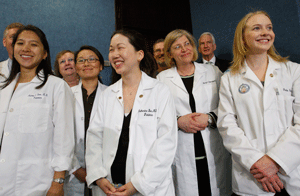Signs of erosion” of support for federal conscience-clause protections began to appear about 10 years ago, reports Susan J. Stabile, the Robert and Marion Short distinguished chair in law at the University of St. Thomas School of Law. Ms. Stabile was the featured speaker at the 25th Catholic Healthcare Administrative Personnel Convention on May 21. Conscience clauses are regulations that protect health care providers who object to performing procedures that violate their religious beliefs or moral convictions.
History of Conscience Clauses. Ms. Stabile traced the beginnings of federal health care conscience-protection statutes to the years immediately following Roe v. Wade, the 1973 Supreme Court decision that asserted a constitutional right to abortion under certain circumstances. Federal legislation passed between 1973 and 2004 sought to protect individuals and institutions from being discriminated against for refusing to participate in actions they found morally objectionable, including abortion. “Existing conscience laws have come under increasing attack by, among others, abortion-rights activists, who want to require all health care personnel and hospitals to provide ‘the full range of reproductive services,’ including abortion,” Stabile said. In addition, she said, “mainstream medical journals are rife with articles and editorials that show hostility to health care providers who refuse to participate in abortion and other morally objectionable procedures.”
She identified two potential threats to federal conscience clauses and concluded that neither one would specifically result in the loss of conscience protections for health care workers.
Stabile cited as the first potential threat the likely repeal of conscience protection regulations adopted by the Department of Health and Human Services in December 2008. The department proposed rescinding the regulations earlier this year, following the change in administrations. Stabile predicted that the regulations will be rescinded, but said the repeal would have little or no legal effect, because the December regulations did not create new restrictions or grant new substantive rights and conscience protection will still be in place under other already existing statutes. Nonetheless, according to Stabile, the move to repeal the regulations reveals that conscience protections are vulnerable to efforts to weaken them by pro-choice national advocacy campaigns, some state governments and the American College of Obstetricians and Gynecologists.
The second potential threat to conscience protections Stabile identified is the proposed Freedom of Choice Act, federal legislation that would invalidate many existing state laws regulating abortion. But that much-debated piece of legislation, which has not even been introduced in the current Congress, “does not directly address the conscience claims of health care entities,” Stabile said. She also said that it is not likely to become law in the near future because President Barack Obama has explicitly said that it is not a high legislative priority for him.
Pluralism. Stabile distinguished between Catholic and secular providers of health care and other social services. “For the Catholic Church, running hospitals, nursing homes, schools and other social services is not a secular activity and cannot be completely separated from its core religious mission,” she said. “When a Catholic organization cares for the sick and elderly or provides for education, it is performing an act as religious as those that take place inside of the church itself. We know that means that when Catholic entities provide social services they must do so in a way that is consonant with its religious principles.”
Still, Stabile said the issue is complicated in a pluralistic society. “We don’t all share a set of common assumptions about what is right and what is wrong. That raises a question as to what personal moral decisions we ought to protect.... We can’t really argue in a pluralistic society with separation of church and state that the government should respect only those claims resulting from a well-formed Catholic conscience.”








